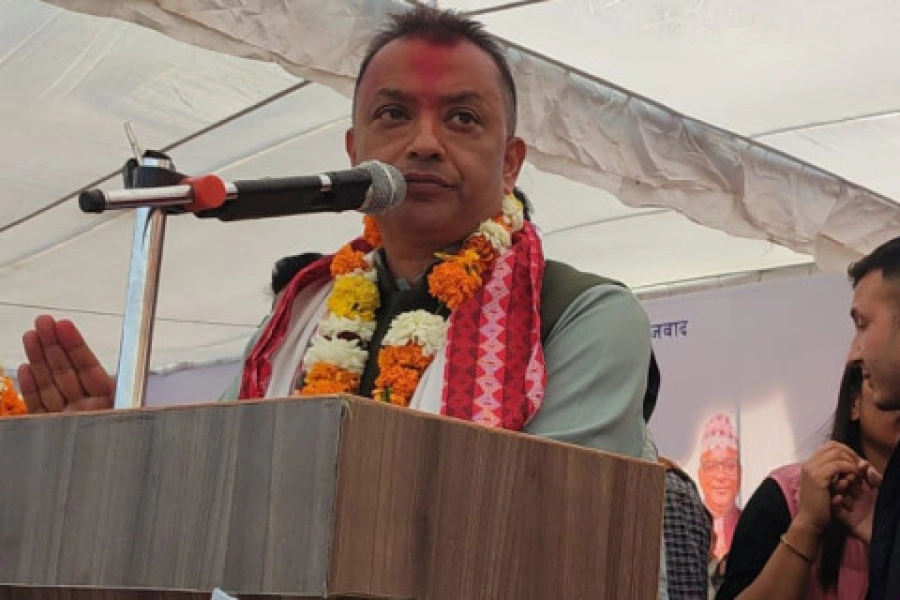In a country with more than a dozen major spoken languages, it is not fair that the works of literary genius like Laxmi Prasad Devkota are relegated to only Nepali language
Great poet Laxmi Prasad Devkota is fondly remembered for masterpieces like Muna Madan, Shakuntal, Prometheus and many others. On the eve of his 111th birthday (November 12), Mahakabi Laxmi Prasad Devkota Study and Research Center had organized the two-day annual conference on Laxmi Prasad Devkota at Rajdhani College on November 9-10.
Leading academicians and critics presented research papers on various aspects of Devkota’s works, particularly centered around Devkota as a myth-maker, as was the running theme of the conference. However,what struck me the most after attending the conference was the likes of Basudev Tripathee, Mahadev Awasthi lamenting the dwindling interest on Devkota and his works at a panel discussion led by Shreedhar Gautam at the conference.
At the conference attended by leading academicians and critics of the country, I was the only attendee under 30. This speaks a lot about the current plight, not just Devkota but the whole industry of our homegrown literature is facing. Lack of interest from the new generation from overexposure and indoctrination to Western and Indian media is but one of the reasons.
SC issues interim order not to demolish Devkota’s house

Stating the obvious won’t solve anything however. Times change and so must we.
The first area we can look at is schooling. It’s not just about including one or two of his works in a textbook. For example, I have but a vague memory of the very amazing poems included in our state-produced school textbooks of Laxmi Prasad Devkota, Madav Prasad Ghimire, Lekhnath Poudyal. Whereas, Basudev Tripathee (Madan Puraskar, Padmashree awardee) was moved close to tears talking about the same poets at the conference.
Our literature deserves not just the tears of learned academicians like him but the average Nepali as well. We’re already seeing the dire consequences of our carelessness today. Younger generation is not good in Nepali. From whence came this change? Shouldn’t we be ashamed that our own progeny admits being defeated by our own mother tongue? Nepali homework is a dreaded chore and fun and active reading is veritably a rare habit.And for that the very pedagogy surrounding Nepali literature in the schools that have mushroomed up in the cities must change. New policy level changes and nation-wide research programs focusing on cultivating interest in the rich literary history of our country must be prioritized.
A second step we can take in the right direction is promoting the works of centers like DSRC. Its members have been sincerely producing research since its inception. Research is hard work and centers like DSRC must focus on producing an enabling atmos Muna Madan, Shakuntal, Prometheus phere where researchers can find materials, funding and proper guidance. However, these centers are still lost in the crowd of the city and it’s only through word of mouth that they have been able to attract members. If the State could provide a reasonable platform or the right amount of funding for them, perhaps school students as young as Grade 10 could attend DSRC programs and learn about the work being done there.The main thing here is to maintain a nurturing, enabling environment.
A third area we can look at is beyond the borders of our own language. In a country with more than a dozen major spoken languages and hundreds more on record, it is not fair that the works of literary genius like Devkota are relegated to just the Nepali language. Muna Madan, famous among his works, is the only piece making great strides in being translated. For others we’ve been relying on translations provided by Devkota himself. A proper agenda, planned out by a think tank comprising academicians and government workers alike is a first step. The committee’s sole work should focus on translating our rich literary heritage into major languages of our own country and that of the world outside.
Much has already been said about Laxmi Prasad Devkota. Devkota was a voracious reader and may have been the only person who very well knew both Eastern and Western literary trends of his time in the country. His unnatural ability to write poems and epics of sheer depth and literary quality is unmatched and so is his profound faith in humanity. Shreedhar Gautam was right to point out that one might claim to ‘know’ other literary figures after a certain amount of study, but even those who’ve devoted their whole life to his works claim to know but a slice of the universal man that he was.
Another comment I heard at the conference was that Devkota’s works were ‘hard’ to understand. Granted, the likes of Shakuntal are beyond the reach of the average Nepali teenager today but what about Kun mandir ma janchayaatri? What about Pagal, Pahadi Jeewan and Bhaladmi? These thought-provoking pieces currently reside on cheap paperbacks printed by Sajha Publication.
Cannot the state create a digital library focusing on our veritable treasure trove of literary tradition? That would be the best first small move we can make in the right direction.
The author is pursuing MA in English Literature from Pokhara University




































